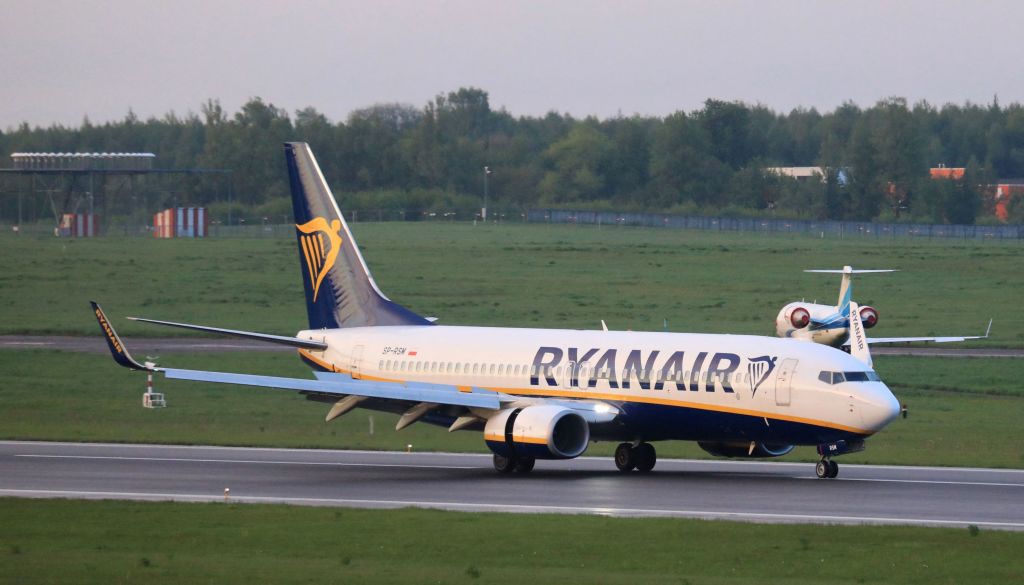Belarus forces plane to land so journalist can be detained


A free daily email with the biggest news stories of the day – and the best features from TheWeek.com
You are now subscribed
Your newsletter sign-up was successful
Alexander Lukashenko, the authoritarian president of Belarus, ordered a fighter jet on Sunday to intercept a Ryanair plane headed from Greece to Lithuania, forcing it to land in Minsk so a dissident journalist on board could be arrested.
The act was immediately condemned by European leaders, including Lithuanian President Gitanas Nauseda, who called it "abhorrent," and Poland Prime Minister Mateusz Morawiecki, who described it as "an act of state terrorism."
While flying over Belarus, the plane's pilots were told by Belarusian air traffic controllers there was "a potential security threat on board," and they needed to divert to Minsk, Ryanair said in a statement. Belarusian state media said a bomb threat had been called in, and Lukashenko ordered an MiG-29 fighter jet to escort the plane to the Minsk airport.
The Week
Escape your echo chamber. Get the facts behind the news, plus analysis from multiple perspectives.

Sign up for The Week's Free Newsletters
From our morning news briefing to a weekly Good News Newsletter, get the best of The Week delivered directly to your inbox.
From our morning news briefing to a weekly Good News Newsletter, get the best of The Week delivered directly to your inbox.
Once the plane landed, authorities arrested passenger Roman Protasevich, a 26-year-old dissident journalist who has lived in exile in Lithuania for the last few years. He is the co-founder and former editor of NEXTA Telegram channel, an opposition outlet that is one of the few still in existence following last year's protests against Lukashenko amid a contested presidential election. In 2020, Protasevich was placed on Belarus' list of terrorists, and stands accused of inciting hatred and mass disorder; if convicted, he faces 12 years in prison.
One of Protasevich's fellow passengers told Agence France-Presse the journalist "was not screaming," but it was "clear that he was very much afraid. It looked like if the window had been open, he would have jumped out of it." After seven hours, the plane was able to take off, and landed in Lithuania 35 minutes later. Belarusian law enforcement officials said no bomb was found on board, and investigators have opened a criminal case into the fake bomb threat. Ryanair said in its statement that "nothing untoward was found."
Lukashenko has been in power for more than 26 years, and is often referred to as "Europe's Last Dictator." He was able to crack down on last year's massive protests with the support of Russian President Vladimir Putin. Belarus is not part of the European Union, but in 2020 the bloc imposed sanctions on Lukashenko and other top officials for "violent repression and intimidation of peaceful protesters, opposition members, and journalists." Read more at The New York Times.
A free daily email with the biggest news stories of the day – and the best features from TheWeek.com
Catherine Garcia has worked as a senior writer at The Week since 2014. Her writing and reporting have appeared in Entertainment Weekly, The New York Times, Wirecutter, NBC News and "The Book of Jezebel," among others. She's a graduate of the University of Redlands and the Columbia University Graduate School of Journalism.
-
 What to know before filing your own taxes for the first time
What to know before filing your own taxes for the first timethe explainer Tackle this financial milestone with confidence
-
 The biggest box office flops of the 21st century
The biggest box office flops of the 21st centuryin depth Unnecessary remakes and turgid, expensive CGI-fests highlight this list of these most notorious box-office losers
-
 What are the best investments for beginners?
What are the best investments for beginners?The Explainer Stocks and ETFs and bonds, oh my
-
 Key Bangladesh election returns old guard to power
Key Bangladesh election returns old guard to powerSpeed Read The Bangladesh Nationalist Party claimed a decisive victory
-
 Epstein files topple law CEO, roil UK government
Epstein files topple law CEO, roil UK governmentSpeed Read Peter Mandelson, Britain’s former ambassador to the US, is caught up in the scandal
-
 Iran and US prepare to meet after skirmishes
Iran and US prepare to meet after skirmishesSpeed Read The incident comes amid heightened tensions in the Middle East
-
 EU and India clinch trade pact amid US tariff war
EU and India clinch trade pact amid US tariff warSpeed Read The agreement will slash tariffs on most goods over the next decade
-
 Israel retrieves final hostage’s body from Gaza
Israel retrieves final hostage’s body from GazaSpeed Read The 24-year-old police officer was killed during the initial Hamas attack
-
 China’s Xi targets top general in growing purge
China’s Xi targets top general in growing purgeSpeed Read Zhang Youxia is being investigated over ‘grave violations’ of the law
-
 Panama and Canada are negotiating over a crucial copper mine
Panama and Canada are negotiating over a crucial copper mineIn the Spotlight Panama is set to make a final decision on the mine this summer
-
 Why Greenland’s natural resources are nearly impossible to mine
Why Greenland’s natural resources are nearly impossible to mineThe Explainer The country’s natural landscape makes the task extremely difficult
